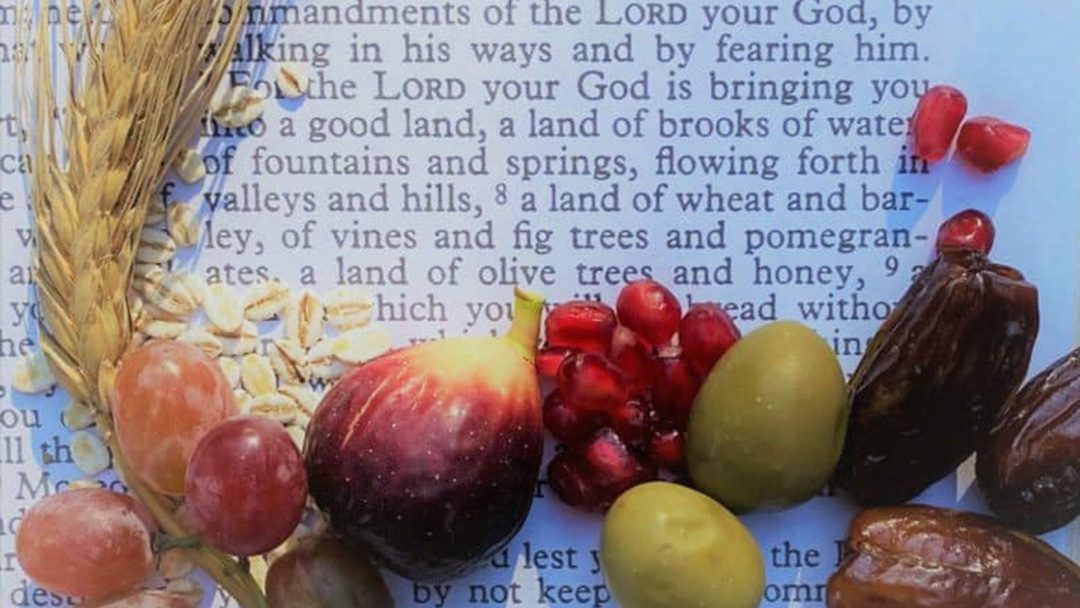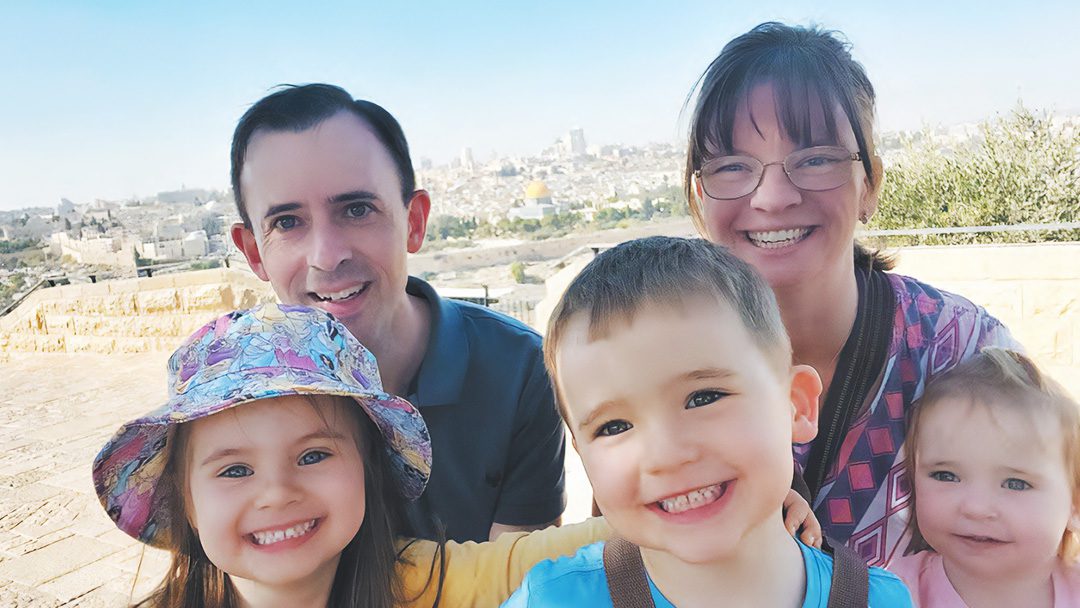This is my fourth and last article sharing some thoughts from the Torah portion, or parsha, named Ekev—Deuteronomy 7:12 – 11:25—in which we read how Moses encourages the Israelites who are about to cross the Jordan into the Promised Land to put their trust wholeheartedly in God, and to discover how He will abundantly bless them if they faithfully listen to and obey Him.
We see for example in Deuteronomy 8:8-10 the Lord’s desire to pour out blessing upon His people, including the promise of rich agricultural blessing in the land: “A land of wheat and barley, of vines and fig trees and pomegranates, a land of olive oil and [date] honey”—the well-known seven species.
We have however been discovering that their experience of these many promised blessings is dependent upon a number of important conditions—that he shall receive blessing from the Lord who (1) holds fast to the Word of God, (2) displays true humility, and (3) demonstrates obedience to our Lord.
Throughout the Scriptures our good God whose heart is always to bless His people is revealed as a God of incredible patience, compassion, love, faithfulness, mercy, forgiveness and grace. Hear echoes of Micah 6:8 as you hear now the words of the Lord to His people in Deuteronomy 10:12-15:
“And now, Israel, what does the Lord your God require of you, but to fear the Lord your God, to walk in all His ways and to love Him, to serve the Lord your God with all your heart and with all your soul, and to keep the commandments of the Lord and His statutes which I command you today for your good? “Indeed heaven and the highest heavens belong to the Lord your God, also the earth with all that is in it. The Lord delighted only in your fathers, to love them; and He chose their descendants after them, you above all peoples, as it is this day.”
This is the loving God who, as Rabbi Lord Jonathan Sacks reminds us, calls His people to listen. We read the opening words of this Torah portion: “Then it shall come to pass, because you listen to these judgments, and keep and do them, that the Lord your God will keep with you the covenant and the mercy which He swore to your fathers.” Rabbi Sacks goes on to say: “These words with which our parsha begins contain the verb sh-m-a. It occurred in last week’s parsha in the most famous line of the whole of Judaism, Shema Yisrael.
“One of the most striking facts about the Torah is that, although it contains 613 commands, it does not contain a word that means ‘to obey.’ The verb used by the Torah in place of ‘to obey’ is sh-m-a.”
We should at this point note that sh-m-a conveys a variety of meanings, including to hear, to listen, to heed, to pay attention to, to understand, and to be willing to obey. “This [says Rabbi Sacks] is of the highest possible significance. It means that blind obedience is not a virtue in Judaism. God wants us to understand the laws He has commanded us. He wants us to reflect on why this law, not that. He wants us to listen, to reflect, to seek to understand, to internalise and to respond. He wants us to become a listening people.
“If we want God to listen to us we have to be prepared to listen to Him. And if we learn to listen to Him, then we eventually learn to listen to our fellow humans: the silent cry of the lonely, the poor, the weak, the vulnerable, the people in existential pain.” What does this mean, then, for Israel on the brink of entering the Promised Land? What does it mean for you and me? It means this. The God who loves us and cares about us, the God who watches over us and seeks only His best for us, calls us to so listen to and internalise His commandments and His ways that we desire to—and choose to—love our neighbour and the stranger among us, and engage in acts of kindness and compassion, helping to build a society based on love.
The apostle John gave expression to this truth in 1 John 3:17-18: “But whoever has this world’s goods, and sees his brother in need, and shuts up his heart from him, how does the love of God abide in him? My little children, let us not love in word or in tongue, but in deed and in truth.” Deuteronomy 10:17-19 puts it this way: “For the Lord your God is God of gods and Lord of lords, the great God, mighty and awesome, who shows no partiality nor takes a bribe. He administers justice for the fatherless and the widow, and loves the stranger, giving him food and clothing. Therefore love the stranger, for you were strangers in the land of Egypt.”
As Rabbi Jonathan Sacks puts it, “God created the world in love and forgiveness and asks us to love and forgive others.” That is the kind of obedience that pleases God. And my prayer for all those reading this is that we may have an uncompromising desire to please God in all things.
The reality that we have been seeking to understand is that we can only truly reflect the character of our God, and please Him, and experience His abundant blessings, if we hold fast to the Word of God, display true humility, and demonstrate obedience to our Lord. Our Torah portion is named Ekev, a word from the first verse Deuteronomy 7:12, for the Israelites are told that “because (ekev)” or “if” they listen to, keep and do God’s commandments, the Lord will bless and care for them. God desires that we keep His words constantly in our minds and in our hearts, as we read in Deuteronomy 11:18-21:
“Therefore you shall lay up these words of mine in your heart and in your soul, and bind them as a sign on your hand, and they shall be as frontlets between your eyes. You shall teach them to your children, speaking of them when you sit in your house, when you walk by the way, when you lie down, and when you rise up.
“And you shall write them on the doorposts of your house and on your gates, that your days and the days of your children may be multiplied in the land of which the Lord swore to your fathers to give them, like the days of the heavens above the earth.”

My wife and I moved over eight years ago into a new home on the beautiful Sunshine Coast in Queensland. One of the things that we did the day we moved was to affix a mezuzah (pictured right) on the right doorpost of the front door, as a reminder of God’s presence with us, and of all that He requires of us. The mezuzah contains biblical expressions of our love and respect for God and His commandments, as found in this Deuteronomy 11 passage and the important and foundational Shema Yisrael verses in Deuteronomy 6:4-9:
“Hear, O Israel: The Lord is our God, the Lord alone. You shall love the Lord your God with all your heart, and with all your soul, and with all your might. Keep these words that I am commanding you today in your heart. Recite them to your children and talk about them when you are at home and when you are away, when you lie down and when you rise. Bind them as a sign on your hand, fix them as an emblem on your forehead, and write them on the doorposts of your house and on your gates.”
May we all be reminded—one way or another—that God knows what is best for us. He has communicated His heart and His instructions for godly living in His Word. May we live daily in humble dependence upon Him, and in loving obedience to Him bless others with the kindness and compassion that He shows to us.












0 Comments